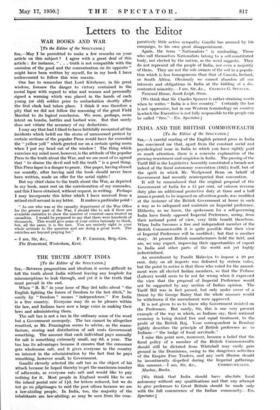INDIA AND THE BRITISH COMMONWEALTH [To the Editor of the
SPECTATOR.]
SIR,—A careful reading of the English printed press in India has convinced me that, apart from the constant social and psychological issue in India to which you have rightly paid so much attention, there is a concrete explanation of the growing resentment and suspicion in India. The passing of the Tariff Bill in the Legislative Assembly constituted a breach not indeed of the fiscal autonomy convention (1921) itself, but of the spirit in which Mr. Wedgwood Benn on behalf of Government had recently reinterpreted that convention.
It will be remembered that the original proposal of the
Government of India for a 15 per cent. ad valorem revenue duty plus an additional protective duty at three and a half annas a pound, to be imposed on all cotton goods, was modified at the instance of the British Government at home in such a way as to safeguard and maintain an Imperial preference. Hitherto, as we know, the spokesmen for a self-governing India have firmly opposed Imperial Preference, seeing, from their national point of view, very little benefit therefrom. When India becomes a free and independent member of the British Commonwealth it is quite possible that their view of Imperial Preference will be modified ; but that is another story. At present British manufacturers hold the field, and are, we may expect, improving their opportunities of export to India and other parts of the world not yet highly industrialized.
An amendment by Pandit Malaviya to impose a 20 per
cent. duty on all imports was defeated by sixteen votes, but the point to notice is that those who voted for the amend- ment were all elected Indian members, so that the Tribune (Lahore) would seem to be not far wrong when it expressed the view that the proposal of Imperial Preference would not be supported by any section of Indian opinion. The Tariff Bill was in fact passed, but only under cover of a threat by Sir George Rainy that the whole measure would be withdrawn if the amendment were approved.
It is not given to us to know why Government insisted on the Preference. But surely, Sir, this is one very present example of the way in which, as Indians say, their national economy is being denied free and equal treatment, to the profit of the British Raj. Your correspondent in Bombay rightly describes the principle of British preference as—to Indians—" the badge of fiscal servitude."
I raise this point now, moreover, because a belief that the fiscal policy of a member of the British Commonwealth should still be dictated from Whitehall may easily gain ground in the Dominions, owing to the dangerous activities of the Embire Free Traders, and any such illusion should be incontinently dispelled during the Imperial gatherings this summer.—I am, Sir, &c., COMMON WEALTH. Marlow, Bucks.
[We think that India should have absolute fiscal autonomy without any qualifications and that any attempt to give preference to Great Britain should be made only with the full concurrence of the Indian community.—En. Spectator.]














































 Previous page
Previous page